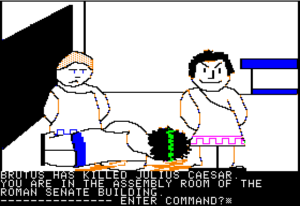Time Zone: Dirt Quest
 Without a doubt, the one game I know that was most influenced by Time Zone is Legend Entertainment’s Timequest, a 1991 graphic adventure by Infocom alumnus Bob Bates. Whether the influence is direct or indirect, I don’t know. But Time Zone and Timequest share an overall structure, based on a grid of location/time period combinations, as well as a few specific scenes: both games contain run-ins with Robin Hood, Cleopatra, and Julius Caesar. The encounter with Caesar in particular reminded me of Timequest: in both games, you get an audience with him through a victory in the arena. What you do with that audience differs, however. In Timequest you need to be on hand to prevent an assassination attempt — not because you want Caesar to live, but because history requires him to be assassinated later. Whereas in Time Zone, you need to borrow his ladder. 1That is, steal it.
Without a doubt, the one game I know that was most influenced by Time Zone is Legend Entertainment’s Timequest, a 1991 graphic adventure by Infocom alumnus Bob Bates. Whether the influence is direct or indirect, I don’t know. But Time Zone and Timequest share an overall structure, based on a grid of location/time period combinations, as well as a few specific scenes: both games contain run-ins with Robin Hood, Cleopatra, and Julius Caesar. The encounter with Caesar in particular reminded me of Timequest: in both games, you get an audience with him through a victory in the arena. What you do with that audience differs, however. In Timequest you need to be on hand to prevent an assassination attempt — not because you want Caesar to live, but because history requires him to be assassinated later. Whereas in Time Zone, you need to borrow his ladder. 1That is, steal it.
This is a common adventure game device: heroic efforts to obtain mundane household items. Timequest isn’t completely innocent of this particular crime against mimesis either. What makes it particularly absurd in this game is that you actually have the option of visiting your home in the present whenever you like. There, realistically, you would have easier ways to obtain a ladder (and a canteen, and a flashlight…) It’s just one of those adventure game things, stemming from the genre’s origins. In a cave crawl, it makes a certain amount of sense: if you’re trapped in the Dungeons of Doom, you have to make do with whatever tools you can find in situ, and a ladder could be a major find. Likewise for various other settings: desert islands, post-apocalyptic ruins, and in general the sort of isolated and solitary environments that adventures have always found most comfortable.
It’s a common enough syndrome that it really should have a name, but it doesn’t seem to have one. I suggest “dirt quest”: questing after something that is, or should be, as common as dirt in the game’s milieu.
| ↑1 | That is, steal it. |
|---|
 Comments(4)
Comments(4)